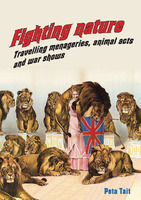Fighting Nature
Travelling Menageries, Animal Acts and War Shows
Author(s)
Tait, Peta
Collection
Knowledge Unlatched (KU)Number
100424Language
EnglishAbstract
Fighting Nature is an insightful analysis of the historical legacy of 19th century colonialism, war, animal acquisition and transportation. This legacy of entrenched beliefs about the human right to exploit other animal species is yet to be defeated. Throughout the 19th century animals were integrated into staged scenarios of confrontation, ranging from lion acts in small cages to large-scale re-enactments of war. Initially presenting a handful of exotic animals, travelling menageries grew to contain multiple species in their thousands. These 19th-century menageries
entrenched beliefs about the human right to exploit nature through war-like practices against other animal species. Animal shows became a stimulus for antisocial behaviour as locals taunted animals, caused fights, and even turned into violent mobs. Human societal problems were difficult to separate from issues of cruelty to animals.
Keywords
History; 19th century; animal rights; animal spectacles; animal welfare; animals and society; animals and civilisation; animals in the performing arts; circus; exotic animals; human–animal relationships; modern history; Elephant; LondonDOI
10.30722/sup.9781743324301ISBN
9781743325001OCN
920569989Publisher
Sydney University PressPublisher website
https://sydneyuniversitypress.com.au/Publication date and place
Sydney, 2015-12-31Series
Animal Publics,Classification
Animals and society


 Download
Download